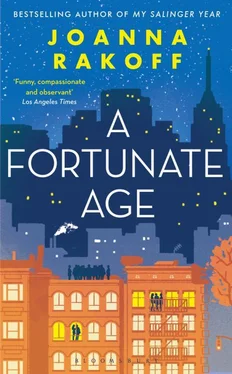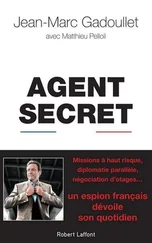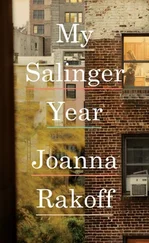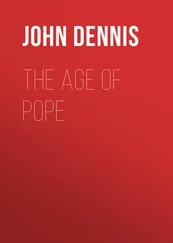With uncharacteristic violence, Beth pushed away her plate, her sandwich untouched. “No, Mom, it’s not. It’s not . You don’t know what it’s like. It’s horrible .” Mrs. Bernstein could say nothing. Her mouth felt fused together. “It’s supposed to be good to be on your own,” Beth continued angrily. “Everybody says that. But it’s not. It’s not fun. I don’t want to be alone anymore.” “But, Beth, you can’t just marry the first man who asks you because you don’t want to be on your own anymore.” Beth put her hands to her temples. “I know that!” Her voice was rising to levels inappropriate to the third-floor café at Saks. “Mom, I’m not an idiot. I wouldn’t marry Will if I didn’t love him. It’s just, I’m afraid—” Her voice cracked and Mrs. Bernstein prayed no tears would come. It was too much, just too much. “I’m afraid I love Dave, too.” Her head sank low toward the table. Miserably, she looked up through her bangs at her mother.
Before Mrs. Bernstein could formulate a response, Beth had pulled herself up straight in her little wire bistro chair. “I guess, I just don’t think ‘the one’ exists. I think we make choices. We decide who ‘the one’ is, but we don’t realize we’re deciding because our, I don’t know, conscious minds are saying, ‘This is the one.’ But there are all these other people out there, who we could just as easily fall in love with and make a life with. It would just be a different life, a different sort of being in love. I don’t know why I’ve chosen Will. I don’t, really. Maybe because it makes more sense . I can imagine our life together. But when I imagine life with Dave, I see a blank screen. Or, I see him, in an apartment, alone.” She laughed. “I’ve been thinking about it all week. And, it’s like, I can see us talking and laughing at dinner. Or walking around. But when I get to an apartment, I see him, alone.”
Mrs. Bernstein nodded and picked up half of her sandwich. Beth’s dilemma was clear to her now: in marrying Will, she’d finally have to relinquish her fantasy of Dave, the little notion she’d kept tucked away as she went about the business of her life, knowing, perhaps, that it would never come true, that he would never be the person she’d wanted him to be, or even the person she’d met all those years back, when she was really just a teenager, and he an attractive, sarcastic boy, with immense talent (a piano prodigy, a winner of awards) and brains, destined for greatness. He wouldn’t be that boy again, no, certainly not. And he hadn’t become the man they’d all expected. Perhaps he would, with time, and some other woman would reap the benefits. But Beth would be happy then, with a career (with any luck, NYU would keep her on for the fall) and a successful, handsome husband and children of her own (along with Sam, of course). Her daughter was right: people simply made choices.
Beth was eating her own sandwich now—grilled cheese and tomato, always her favorite—with good appetite. The color had returned to her face, though her nose and eyes were still red from the tears. Mrs. Bernstein made a note to take Beth back to the lounge for a quick powder; otherwise, she’d hate the way she looked in all the dresses. The girl dabbed at her lip with her large cloth napkin. Pure white , Mrs. Bernstein thought. With her freckles, t he dress has to be pure white . She looked around the room at the tables and tables of women picking at salads or sipping spoonfuls of soup, sharing small slices of pie or Danish cut in quarters, just as she and Beth used to do. All of these women, she thought, had chosen—at some point—propriety, security… over what , though? What was the other option? An amour fou ? For a grand passion to be grand, need it come with danger? Hadn’t she loved Donald madly—and didn’t she still—despite him being exactly the sort of person her parents might have chosen for her, with the house in Scarsdale, the inheritance, the dental degree, the practice he’d taken over from his father? Her eye settled on an important-looking lady, with a thick sheath of white hair and a scarf fastened by a large cameo. Had that matron, one day in the distant past, given up a Dave for a Will? If she hadn’t, where might she now be? A memory languished along the fringes of Mrs. Bernstein’s brain—some choice not taken, a dashing lover promising excitement and understanding. Whom could she be thinking of? That sad man with his dark, loamy eyes? No. There was no one, no one at all.
Dave Kohane lived in a pleasant, three-room garden-level apartment on Bergen Street, which he’d purchased earlier that year with the bit of money he’d come into following the death of his grandmother. This lady—his father’s mother—had been a tiny, churlish person with great mounds of white hair, who, until the very end, cooked massive Mitteleuropean dinners, beginning with hot borscht and ending with plum tart, a roast chicken or pot roast arriving somewhere in between. She had not been rich—at least, not by New York standards—but had, it turned out, been far richer than her two sons knew. She ate brown bread and cottage cheese for breakfast every day, dressed herself in boiled wool suits purchased during the Kennedy administration, and sent Dave and his cousin Evelyn, her only grandchildren, twenty-five-dollar checks twice each year, for Hanukkah and their respective birthdays in November and May. Dave’s uncle Steve, Evelyn’s father, was a corporate lawyer and devoted considerable effort to wresting control of his mother’s assets, thinking he could invest them for her—or, better yet, turn them over to another Kohane cousin, a crackerjack CFP who had cut his teeth in analysis at Goldman, Sachs—but the woman refused, saying Dave’s grandfather had arranged everything “very nicely” before his death. She had a “nice young man” at T. Rowe Price with whom she spoke once each month.
As it turned out, this nice young man did very well by her. “Jeez,” Uncle Steve had said, sipping beer in Dave’s parents’ tiny kitchen, two weeks after the funeral. “Who knew Mom was loaded? Those twenty-five-dollar checks. God.” Dave’s father nodded sympathetically. He was a lawyer, too, but did labor work, having met Dave’s mom when they were both canvassing for the AFL-CIO after college. Dave’s mom made documentaries about migrant workers and African wars. They didn’t think about money much. Or rather, they thought about it all the time, having rarely had enough of it, but—as they explained to Dave when he was old enough to understand—they’d decided to make compromises. They could have the life they wanted—working for the common good and so on—and live in a small apartment, with carefully chosen luxuries (his father had an overhealthy and, Dave thought, clichéd interest in wine); or they could live a different sort of life—devoted to the acquisition of goods and property—and be less happy in their work. Dave’s father, at various points, had considered going corporate. And Dave’s mom had, on several occasions, been offered jobs at commercial production companies (particularly after a documentary she produced won an Emmy). But they’d stuck to their guns—scrambling and scraping to send Dave to St. Ann’s with Evelyn—and now, in their middle years, they were doing rather well. Their small apartment—one floor of a Baltic Street brownstone that went co-op in the eighties—was now worth twenty times what they’d paid for it. And thanks to that Emmy, Dave’s mom now ran her own production company, out of a little town house on West Ninety-third, with an endless succession of contracts from PBS. The previous year, after she’d finished a six-part series on DNA, they’d bought a small house up near Woodstock, then flown off to Paris and Provence. Next year, they’d go to Italy. And now that they had this surprising influx of cash, from Dave’s grandmother, they could do so in a bit more style.
Читать дальше












